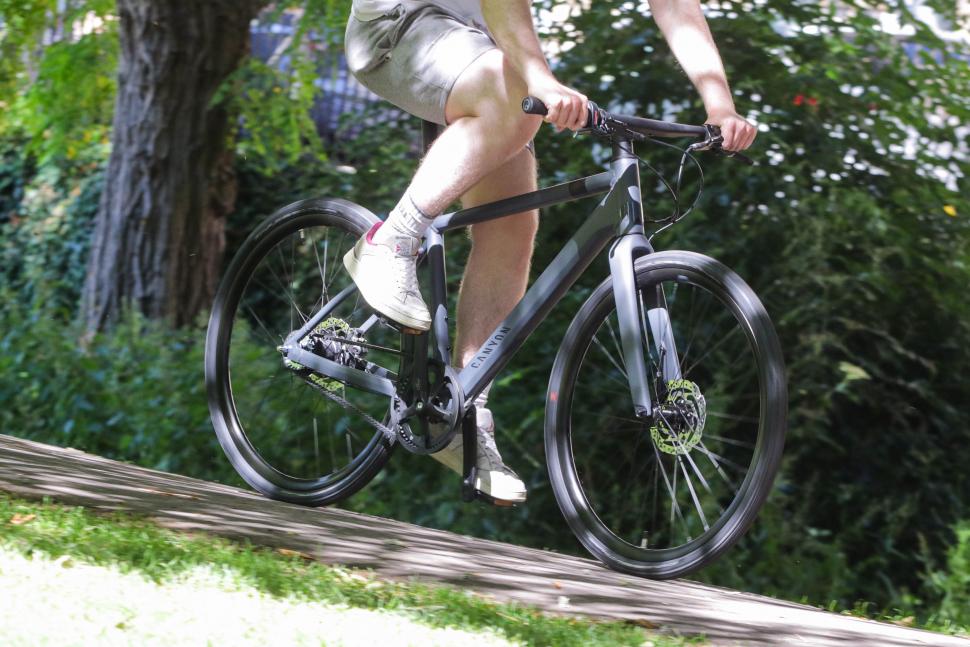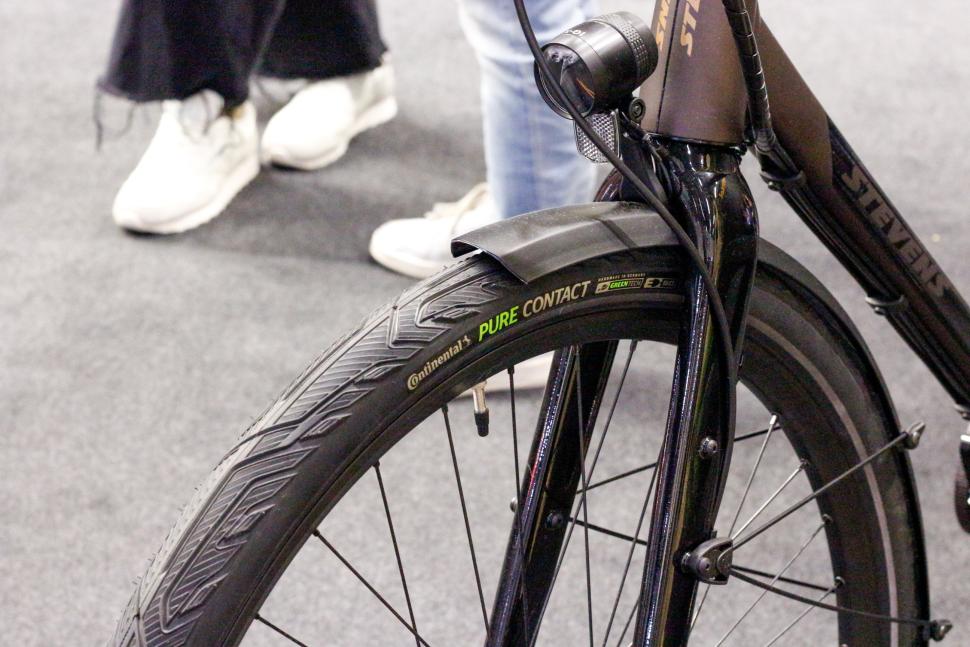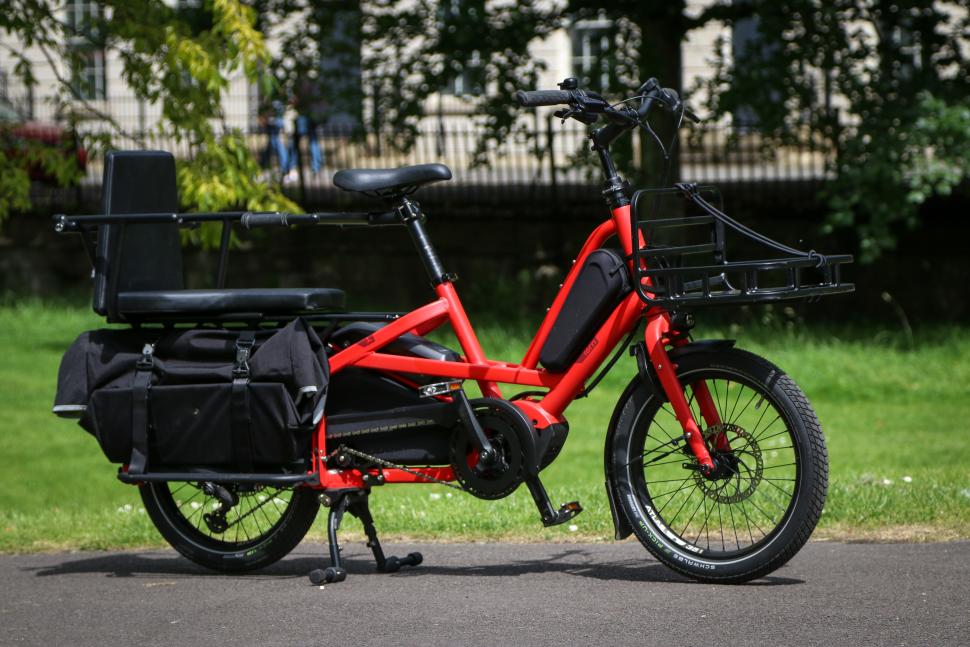- News
- Reviews
- Bikes
- Components
- Bar tape & grips
- Bottom brackets
- Brake & gear cables
- Brake & STI levers
- Brake pads & spares
- Brakes
- Cassettes & freewheels
- Chains
- Chainsets & chainrings
- Derailleurs - front
- Derailleurs - rear
- Forks
- Gear levers & shifters
- Groupsets
- Handlebars & extensions
- Headsets
- Hubs
- Inner tubes
- Pedals
- Quick releases & skewers
- Saddles
- Seatposts
- Stems
- Wheels
- Tyres
- Tubeless valves
- Accessories
- Accessories - misc
- Computer mounts
- Bags
- Bar ends
- Bike bags & cases
- Bottle cages
- Bottles
- Cameras
- Car racks
- Child seats
- Computers
- Glasses
- GPS units
- Helmets
- Lights - front
- Lights - rear
- Lights - sets
- Locks
- Mirrors
- Mudguards
- Racks
- Pumps & CO2 inflators
- Puncture kits
- Reflectives
- Smart watches
- Stands and racks
- Trailers
- Clothing
- Health, fitness and nutrition
- Tools and workshop
- Miscellaneous
- Buyers Guides
- Features
- Forum
- Recommends
- Podcast
feature
 How much money can you save by cycling to work? Sept 2024
How much money can you save by cycling to work? Sept 2024How much money can you really save by cycling to work?
Commuting to work by bike isn’t a new concept, and it offers plenty of benefits. From getting fresh air and exercise in before you’ve even started your day, to often being quicker or at least more enjoyable than driving or getting public transport.
But what about how much it costs? And can riding to work actually save you money on your commute?
How much does the average person spend commuting to work?
> A beginner's guide to cycling to work
Unless you work from home, chances are you spend some money getting yourself to your place of employment. According to the Office for National Statistics (ONS), the average commuter in the UK spends £2,616 per year just getting to work. Those who use trains as their primary mode of transport spend even more on average – namely £3,454 per year.
For many workers, that is a pretty significant amount to be spending year on year, and the cost of commuting is only going up. According to the 2020 National Travel Survey, the average worker spends £17.23 per day to commute to and from work in their car, and we can only assume it’s gone up since 2020.
How far do people commute?
> How to save money on a bike with a Cycle to Work scheme
According to the ONS, the average commute in the UK was 27 minutes in 2021. This ranged between 63 minutes on average for those travelling by rail, and 15 minutes for those walking to work. In 2023 and in England, 70% of all commuting trips were made by cars outside of London, which rose to 81% in rural areas.
On average, a typical commute in the UK for car drivers is 19.5 miles each way. And while that might not be achievable for many cyclists – especially if you need to plan a route to avoid busy roads without cycling infrastructure, the likelihood is many of our commutes are actually shorter than this.
So how much does it cost to cycle to work?
> 9 reasons to get to work by bike plus top tips to get you started
There are a few things we should look at when totting up the cost of cycling to work. There are obvious expenditures like the purchase of the bike itself, and then servicing and maintenance of said bike. But there’s also the addition of kit – if you want to wear anything specific for riding (but you don’t need to), and don’t laugh – but the potential for an increase in your snacking requirements if you’re burning more energy getting to and from work.
When it comes to buying a bike, there are a few ways to go about it to make it as cheap as possible. Firstly, you can buy a bike second-hand. This can be a good way of getting something in reasonable nick if you know what you’re looking for.
If you don’t, and you’re an employee rather than self-employed, there are salary sacrifice schemes like the Cycle to Work scheme. We’ve covered how it works in our guide to it here, but essentially you sacrifice a part of your salary to pay for a bike in monthly instalments. This is taken before tax and national insurance, so you end up paying less of both.
Nowadays you can buy pretty much any bike you like through various schemes – depending on which one your employer has signed up to. This also includes e-bikes, which can certainly make commuting more appealing if you have a particularly hilly route to work.
So... how much can you save by cycling to work then?
> Cycling to work, your ultimate commuting kit list
Let’s mock up an example. If Simon has a £25,000 salary and he chooses an £800 bike through Cycle to Work, a helmet at £50 and lights etc for £150 to bring it to a total of £1,000, his monthly payments and final ownership fee after four years will end up costing him £750 overall. This results in a 25% saving on the RRP. And, the more you earn, the more you’ll likely save due to the savings on tax and national insurance contributions.
Let’s say that the average commuter spends around £1,000 on their bike, helmet and lights. You’ll also want to consider some basic tools or puncture repair kits, which may set you back around £20+. Then, you might want a new backpack or even some panniers. You can spend a lot on these, but basic options can be bought for around £40 for waterproof pannier bags. We've put together an ultimate commuting kit list you can read to get a better idea of what you might want for riding to work.
A typical bike service costs between £30 to £200 depending on the level of service you choose. You’ll want to get a service done at least once a year, more if you ride a lot of miles and in all weathers, so you should factor in consumable parts like brake pads and tyres, too.
So, in total, cycling to work could cost from around £1,200 for an entire year, and that's including the price of a new bike paid in monthly instalments; it'll be even less if/when your bike is fully paid for (until you get the bug and buy another one).
At the very least, you're saving 65% on average commuting costs. This is, of course, a very rudimentary figure, and you can insert your own figures to compare to how much it might cost for your own journey. But the result is clear. Cycling to work can save you some serious cash.
On average, UK car owners are spending £3,800 per year just to keep their cars running. With increases in insurance premiums and vehicle excise duty (VED), plus the fact it can cost hundreds of pounds for a basic car service at the garage, owning and running a car is undoubtedly expensive. Imagine if you could swap out just a few days of driving to work a week for riding, and how much that could save you on fuel, parking and wear and tear costs.
Should everyone commute by bike?
Of course, commuting by bike just isn’t feasible for everyone. Whether it’s due to sheer distance, the type of work you do or the need to carry a lot of things (although you could invest in pannier racks or an e-cargo bike), it’s not the case that everyone can or wants to cycle to work.
That being said, even if you swap the car or train or bus for the bike just once or twice a week – you could see some significant savings. Plus, you’ll likely feel fitter and get to feel smug when you get to the office.
Let us know how much you save by cycling to work in the comments, and any tips for keeping your bike commute as cheap and cheerful as possible.
Rebecca has been writing about bikes for four years, after a typically ill-timed career change pre-pandemic. She's been riding bikes since she can remember, and fell back in love with them after realising it was faster, cheaper, and more fun than getting the bus to work. Nowadays she enjoys all kinds of bikes, from road to eMTB and is training her border collie pup to become a trail dog.
Latest Comments
- imajez 2 hours 49 min ago
- looks like someone has fallen for the steel is real markerting BS. I only care how a bike rides, not what it is made of. I had a lovely steel...
- lonpfrb 4 hours 9 min ago
That argument is ignorance of the widespread height and width restrictions to be found on the many minor roads that were originally created for...
- David9694 6 hours 25 min ago
cyclists should be made to have number plates - Interesting police video here of the range of illegal number plates - we'd got, as the caption says...
- rookybiker 7 hours 37 min ago
The trailer seems to connect to both ends of the rear axle. Can it do tight corners without dragging the tyre sideways?
- froze 7 hours 41 min ago
Motorists have always been unkind to cyclists, but distracted driving is adding to the problem....
- Destroyer666 8 hours 34 min ago
Have you owned Bont shoes? In my experience even the widest Lake shoes have had a bizarre form of narrowing way too much in the toe area. But the...
- froze 9 hours 2 min ago
Not sure if this is possible, but this news letter goes out all over the world, and some places like Decathlon does not send stuff to America, in...
- Hirsute 9 hours 46 min ago
I'm confused as to why you'd need bib shorts indoors.
- Oldfatgit 10 hours 15 min ago
I'm sure you were being sarcastic... however ... Lewis Hamilton lives in Monaco. Yet another car driver that doesn't pay any tax






Add new comment
36 comments
If the cost of a new car is equal to six months net income and you keep it for six years then it needs to reduce your commuting time by 1 month per year to pay back the time spent working for it.
My office is 16 miles away, 270m climbing, hilly cross country route so not an easy cycle... 1km 15% hill to start with.
My office has no shower facility so a dry day is important as I can only wipe down with a flannel before getting changed into clothes I bring in the day before
However, doing it once a week during the British summer time months on a Friday saves roughly a gallon of fuel a week plus wear and tear on the car.... call it £200. Plus I really look forward to it!
The way these statistics are reported bothers me.
If the average commuter spends £17.23 a day, and the average commute is 27 minutes, how on earth are they spending that much?
The £17.23 looks like a basic mean - the total cost of commuting divided by the number of commuters. This number is essentially meaningless because it doesn't take into account the skew resulting from a few very expensive commutes.
To report correctly what the cost to the average commuter is you first need to work out who the average commuter is, and you might do that by categorising commute lengths and types and finding which category contains the greatest number of people. You might then find the median cost of the people within that category and then report that number as the daily expenditure of the average commuter. You might choose a different method, but if you're just going to report a mean without any context you might as well not bother.
Edited, thanks to sanity check from the posters below.
What you've described is a mean, not a median.
You are correct, but pointing it out is just median.
Just an average day for me.
Fair to middling?
Thanks. I must have been having a moment.
Just the health benefit alone of one extra hour of sunlight and exercise a day, is priceless.
I'd say I save £600 on fuel per year. Whether that or more is then spent on new bike things, kit, tech, tyres, wheels etc...
It makes you feel better though, and you never have to worry about traffic jams, just the idiots who want to drive into you
We've saved an astonishing amount since binning the car, about £3000 a year on car maintenance, insurance, parking permits and fuel, £1800 a year on Mrs H's commuter train fares, about £2000 a year on other train fares, £500 a year on Mrs H's gym membership (if you ride about 200km a week just in commuting you really don't need a gym)...we already had two bikes each and the commuter bikes cost £1700 between them (secondhand), we don't spend more than about £200/300 a year on tyres and chains etc and the rest is pure savings. It's been a major contributor to the fact that we're going to pay off our mortgage around the turn of new year, plus we're fitter and happier, what's not to like?
(Caveat: we do live and work in London with a dozen bus routes and three train stations within half a mile of the front door, I realise it's not going to be as easy for everyone as it is for us)
Thanks for sharing details - also nice pointer for "why" eg. stop renting from the bank sooner!
Now the UK's provision of public transport is really patchy (never mind active travel) - particularly "out of hours" and across urban boundaries. And access to amenities is also really variable (because we have literally, deliberately built in motor dependency - in fact we're still doing so!) ...
... BUT the UK population is in fact predominantly urban and increasingly so. And much of that is in bigger conurbations.
https://www.statista.com/statistics/984702/urban-and-rural-population-of...
It's actually a good time to add an alternative to private motor transport!
It's not just the money saved - it's the time saved. (And time is money)
This is an interesting feature actually; I reckon the savings are probably zero unless you exchange the car for a bike and be very resolute about the whole thing, and also do your own servicing. The bigger benefits are probably health and sanity.
Really? I would have thought the maintenance costs caused by lots of commuting miles will be much higher for a car, plus the petrol costs.
I agree there'll be a big range for cyclists; one on a fixie they paid nothing for who does all all their own maintenance at one end of the spectrum and another on a fancy bike who pays a mechanic to do everything at the other end.
Garages often argue cars that do less miles cost more to maintain, as fluids and lubrication tends to dry, leading to increase wear and damage on components.
It's abit like your car is actually more fuel economical to run if you consistently drive long mileages, whilst less frequent short journeys use more petrol per mile in comparison.
I'd agree that the mental and physical health benefits were (and still are) the most significant part for me. Covid times 2020-on were particularly demanding and the ride home helped my head better than any drug could have done.
I started commuting by bike in 2006. Since I still owned a car the saving was not huge. However, my car's annual mileage dropped, which meant that, as well as using less fuel, some parts lasted longer; more importantly for me, the car itself lasted longer before it had to be replaced, a few weeks before its 25th birthday. Using the bike also means that I can be flexible and have no difficulty getting to work when the car needs servicing or repair work.
My original commute was 5 miles each way but heavy town centre traffic meant the time for each mode of transport was very similar. I enjoyed riding far more than the frustratingly slow car journey. My old MTB required very few parts over the next 3 years.
When the office moved to 8 miles from home I should have been saving even more money but I joined a club and started time trialling shortly afterwards so my riding and bike-related riding spending both increased.
Thing is - the government has a lot of control here! They can influence the balance of fixed costs and variable ones. Currently we have essentially fixed cost taxes that you pay however far you drive - even with tax on fuel it's still very cheap.
If we get a bigger fraction of electric vehicles the government should be motivated to look again at something to replace VED. So it's just possible we could see tweaks to the system such that people aren't so motivated to rather than use other modes *once they have a car*.
Been cycling to work for 10 years and not had a car for the last 3 years. I also do other journeys to shops and round about by bike.
i reckon I save about £400 per year on fuel, and about £1200 per year on running costs.
i have just spent £600 on a new bike to replace a 9 year old on which I'd done 9000 miles on so overall makes me a lot better off, as most of the kit I have lasts a few years, and I also ride for fun.
One thing's for sure. We're the only road users who don't have to worry about fuel duty, pay-per-mile or vehicle excise duty as regards the coming budget.
Are they going to add this for electric vehicles then?
They're adding VED for some electric vehicles.
https://www.gov.uk/guidance/vehicle-tax-for-electric-and-low-emissions-v...
Nothing to do with the coming budget, which doesn't mean there won't be further changes.
My potential annual savings are £259 in bus fares or £264 in rail fares.
Minus the cost of the extra wear and tear your bike etc. will be subjected to?
Bought a Daws Karakum in 2006 and have had very little trouble with it. Invested in Schwabel tyres a few years ago and haven't had one puncture since. Going in for a refurbishment in January, so that'll add a few years of life onto it.
My commute of 80miles (now 70miles after an office move) is too far too far to do on bike regularly (I did it once to the old office) but I saved circa £6 by not taking a branch line and after including the wait and walk I was faster. But I only in the office twice a week. At the new office I've a similar saving by getting off the train two stops early but its not faster, it is more pleasureable though. Even on days like today when it was solid rain and a lot of flooding I reckon at most I save around £500pa in rail fares but as I say its more pleasurable and the health benefits are worth more
I reckon at most I save around £500pa in rail fares but as I say its more pleasurable and the health benefits are worth more 
In Toronto, Canada, bicycle commuting can be a real bargain on shorter commutes. The city bike share system gives unlimited rides of up to a half an hour at a cost of $105.00can for a year. You do need to have a credit card. Compared to the next cheapest cost of an annual transit pass for one year @ $143.00can paid monthly. No lock, no maintenance , no capital up front.
Alas, I found the second breakfast usually ate up the savings on train fares.
And I found the journey took me twice as long as by train and three times as long as by car, thanks to all the traffic lights, etc. I decided I'd rather spend that time working, which was more pleasurable, as well as more lucrative.
The trick is realising you don't need the second breakfast. Fight the temptation. 2nd breakfast and other food (often carb loaded) after big workouts ended in a massive heart attack and 3 resuscitations for me. Core fitness helped me survive the event and work with the ambulance crew and surgeon. Also helped my rehab (on line during lockdown, everyone in the group had done lots of exercise: no couch potatoes, smokers, heavy drinkers; but all carb loading fitness fans)
Pages